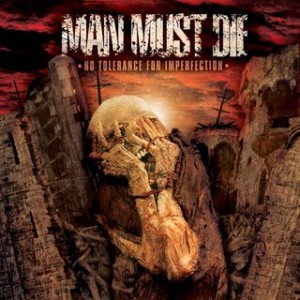By Kyle Harcott
Things may be dark now, and god knows they may get a whole lot darker still – but you’ve got to keep moving, because the only way is through. That’s the overall promise and premise I took away from 17th Street, Hammers of Misfortune’s first release of all-new material since signing to Metal Blade early in 2010. If there’s a band that’s earned their stripes for masterful songcraftery, deft hookery, and sheer fuck-it-all-and-fuckin’-no-regrets metal-rulebook nose-thumbery, album after unequalled album, it’s unquestionably San Francisco’s Hammers of Misfortune. 17th Street, the band’s fifth full-length, is every bit as chock-a-block with powerful songs as past masterpieces. And perhaps even more so, front-to-back as it is with gigantic hooks that will not be denied.
Pregnant with a veiled, weary sadness, lead single “The Grain” still bears up hopeful, with riffs full of the promise that things will get better. Nowhere is this feeling more evident than in the song’s latter two minutes, as the tandem guitar attack of John Cobbett and Leila Abdul-Rauf gallops toward the song’s end like some Chariots of Fire riffola footrace on the sand, propelled along by Sigrid Sheie’s contemplative piano. By the time the guitars drop out and Sigrid’s piano gently carries the song to bed, there’s definitely something plucking away inside of you, but it’s hard to tell if it’s your heart breaking or soaring; maybe both. Joe Hutton turns in a first-rate performance on the track, his powerful voice pitching the song to greater altitudes.
Make no mistake, though – there’s still loads of foreboding at work here, as early as intro “317”. From the opening monolith of riffs cast down like meteors, through the dreamlike guitar solo, leading into Hutton’s vocal, admonishing We are the soil becoming dust, there’s a palpable apprehension. And it sticks around to lead into the following title track. Propelled by a taut thrash riff, and bolstered by Sigrid’s legendary Hammond, “17th Street” is as gigantic as it is hard-driving, and catchy in the same indescribable way your favorite Thin Lizzy records are catchy.
All told, though- for an album whose theme Cobbett has described as being “about loss, and endings”, there definitely feels like a lot of hope being hatched in the grand scheme as well. In that sense, 17th Street feels like the perfect successor to 2008’s Fields/Church of Broken Glass, itself a bombastic, emotional-rollercoaster of a record. And nowhere does the new record illustrate this better than on its most transcendent moment, the heartbreaking “The Day the City Died”, a thunderous ode to friends who left. Within its bereft sadness, the song manages to find a voice of triumph, Hutton’s vocal poignant and sublime in the midst of saying heroic goodbyes.
Meanwhile, the rhythm section of Chewy Marzolo and Max Barnett drive the song home with their low-end thunder, nailing the song’s accents like hammers on steel. Marzolo’s drumming especially stands out here, as he manages to cast off tight, impressive-yet-tasteful fills throughout the song’s back half.
17th Street is another impeccable notch in the Hammers’ collective belt, and while it may be their most sophisticated and accessible album to date, it is without a doubt sonically and thematically classic Hammers of Misfortune. One of the must-have albums for 2011.
(Metal Blade)


